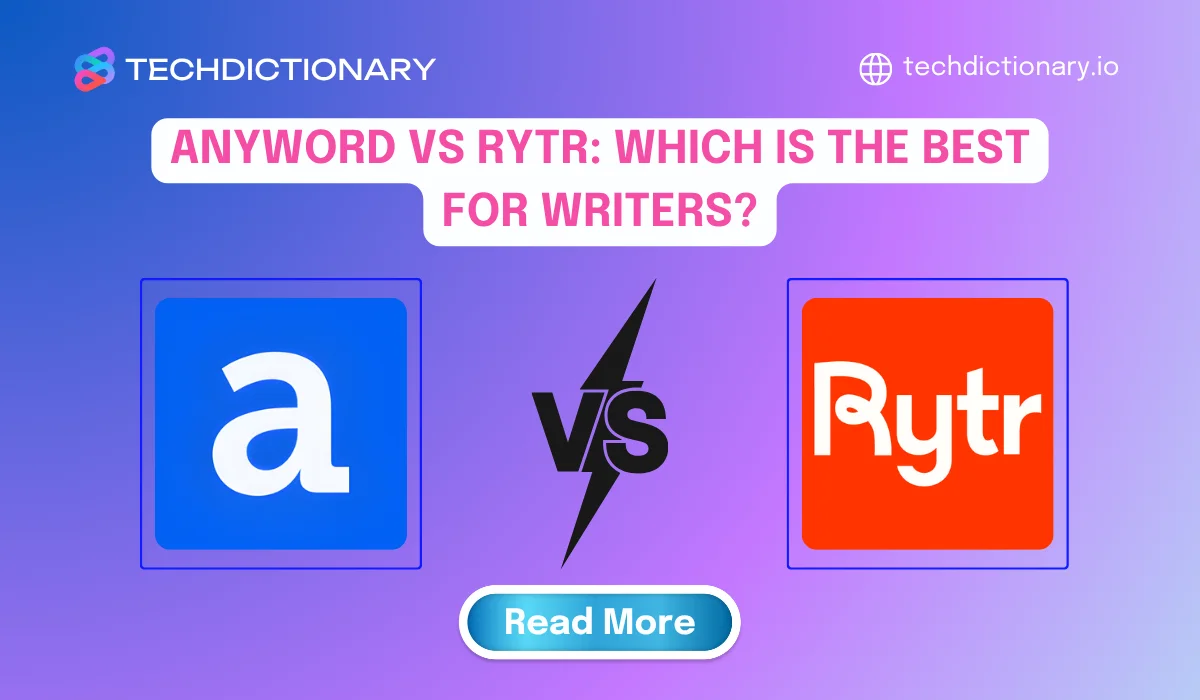
As a team of content writers, we live on the front lines of the AI revolution. We test everything and get frustrated by the hype. We’ve stared at that blinking cursor, wondering which AI tool actually saves time without costing a fortune.
The Anyword vs Rytr debate is the perfect example. One promises “data-driven” genius, the other “get-it-done-now” simplicity.
But which one is the right partner for a writer?
We tested both and dug through the marketing noise. Here’s our honest review, from one writing team to another.
Before we get into the details, here’s the truth from our team:
The Bottom Line: Our team agrees: Anyword is a high-cost, high-performance “Enterprise Powerhouse” built for ROI. Rytr is the “People’s Champion,” offering incredible versatility and value for a low (or free) price point.
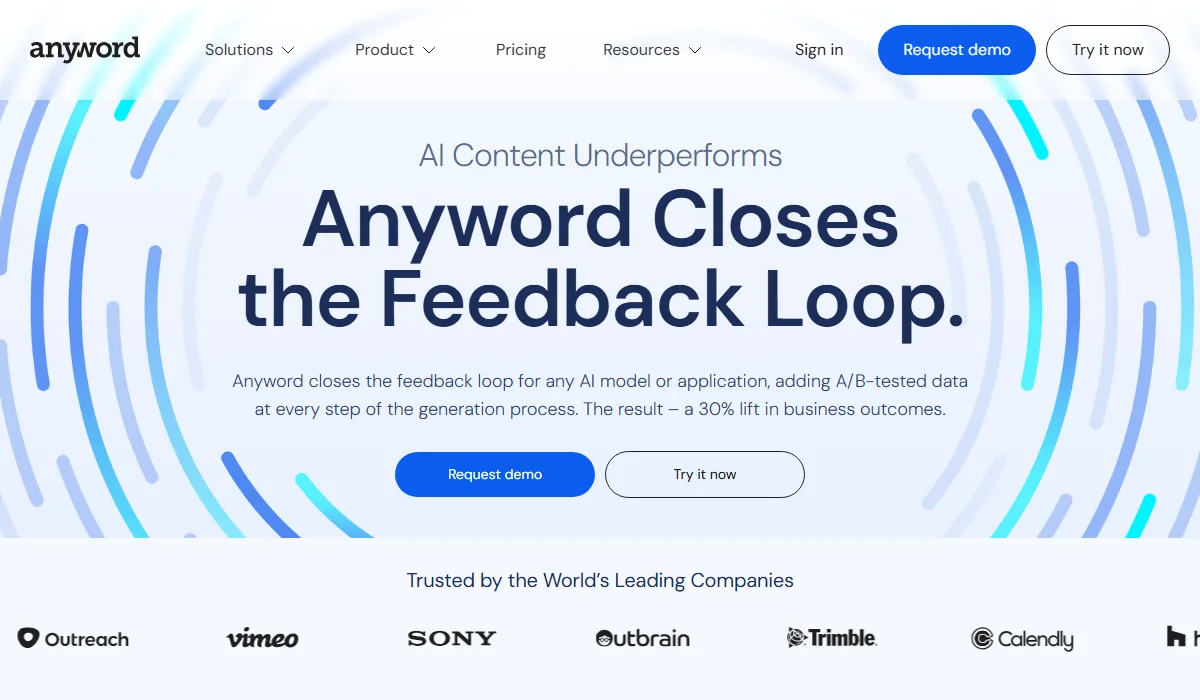
Anyword’s enterprise-focused predictive performance scoring
We’ll be honest, we completely underestimated Anyword. We went in thinking it was just another AI writer.
We were wrong!
We quickly realized Anyword is playing a different game. It’s an enterprise platform built around a single powerful idea: Predictive Performance Scoring. It’s not about just writing; it’s about forecasting success, trained on a massive $250 million in ad spend data.
Then, we found the security specs. This is where we were incredibly impressed. It has SOC 2, ISO 27001, GDPR, and HIPAA compliance. That’s not for bloggers. That’s for organizations with strict security needs, proving Anyword is a serious tool for ads, emails, and blogs at an enterprise scale.
You may be interested in: Anyword vs Writesonic: Which is the best for Writers in 2025?
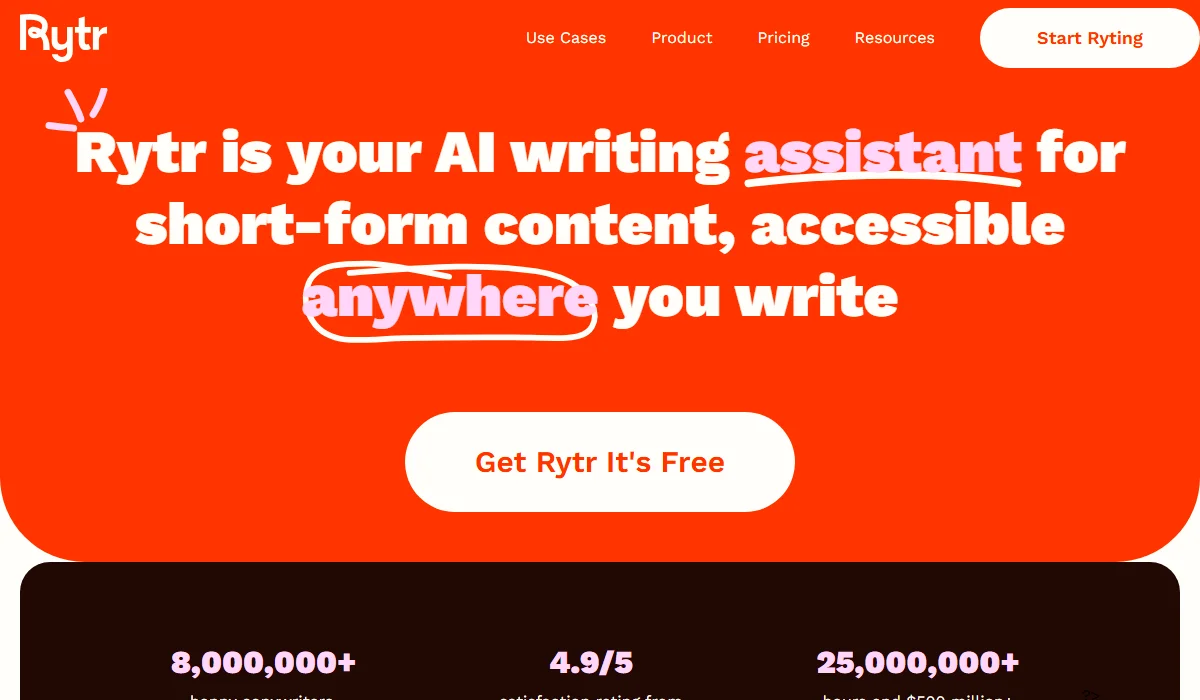
Rytr’s simplicity, speed, and support for diverse content and languages
Rytr is different. It feels like it was built specifically for us—the everyday writers. It’s a clean, simple AI assistant, perfect for individuals and small businesses.
It runs on OpenAI’s latest APIs and offers over 40 content templates (use cases) for blogs, social media, product descriptions… everything you need!
But what our team loved immediately was the support for 30+ languages and 20+ tones. The whole vibe of Rytr is speed and simplicity. They claim to have saved users over 25 million hours and $500 million. After tackling a tight deadline project with it, we can certainly see how that time-saving feature adds up.
This is where the real battle happens. We put five critical features head-to-head to see who really won. Here’s a quick summary of our findings:
| Feature | Anyword | Rytr | Winner |
| Unique Capability | Predictive Performance Scores (82% accuracy) | Creative & Marketing Versatility | Depends on Goal |
| Content Generation | “All-in-One” Blog Wizard | “Hands-On” Doc Editor | Depends on Goal |
| SEO Optimization | Built-in SEO Tools | Basic Tools + Semrush | Anyword |
| Brand Voice | Enterprise-Level Profiles | “MyVoice” Custom Tones | Depends on Goal |
| Integration | HubSpot, Google Ads, Meta, ChatGPT, API | Chrome Extension (In-line) | Depends on Goal |
When we analyzed Anyword, we realized the Predictive Performance Score is its core feature. It’s not just a metric that looks good but has no real value. It predicts content performance with 82% accuracy, helping marketers save on real-world A/B testing costs. This is a tool with “Depth,” clearly built to maximize ROI.
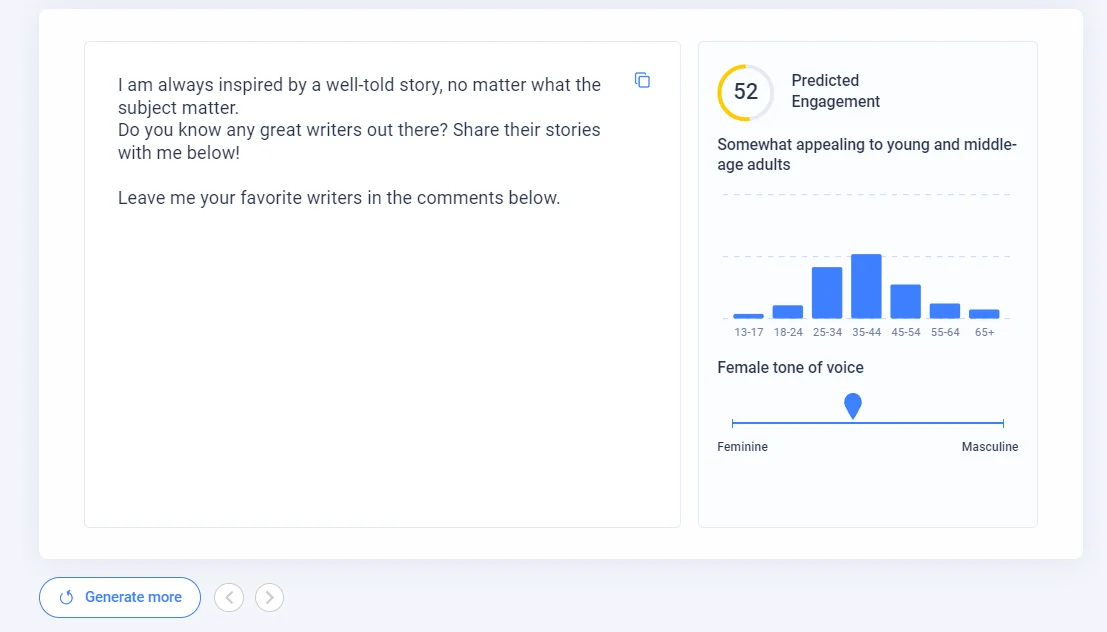
Anyword’s Predictive Performance Score for accurate content forecasting.
On the other hand, Rytr’s strength lies in its Creative & Marketing Versatility. We’re talking about a notable “Breadth” with over 40 Use Cases. We noted that it has templates for “Song Lyrics” and “Story Plots” right alongside traditional marketing templates.
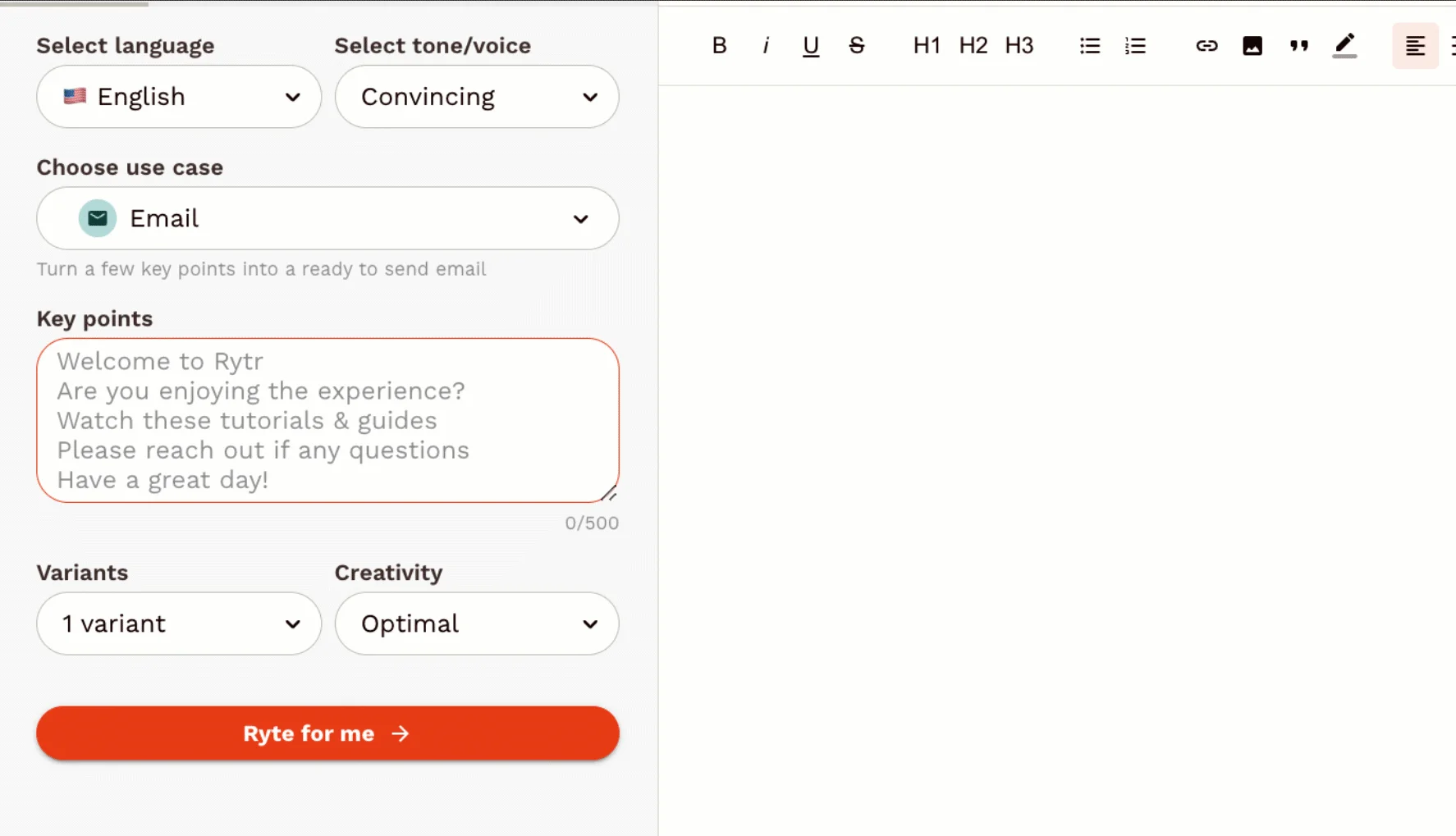
Rytr’s creative and marketing versatility with 40+ use cases
Our team saw this as a fundamental difference. Anyword’s “Depth” is essential for a data-driven marketer. Meanwhile, Rytr’s “Breadth” is a real lifesaver for a creative writer. Because they excel in two completely different directions.
Winner: Depends on Goal
After testing both, we realized they have two completely different philosophies on “quality.”
Anyword doesn’t just write; it optimizes. Everything it creates is tied to its Predictive Performance Score (82% accuracy). We found its content (especially for ads, emails, and landing pages) to be very “polished” and highly “persuasive.” It’s clearly trained on $250 million in ad data to convert, not just to “write prose.”
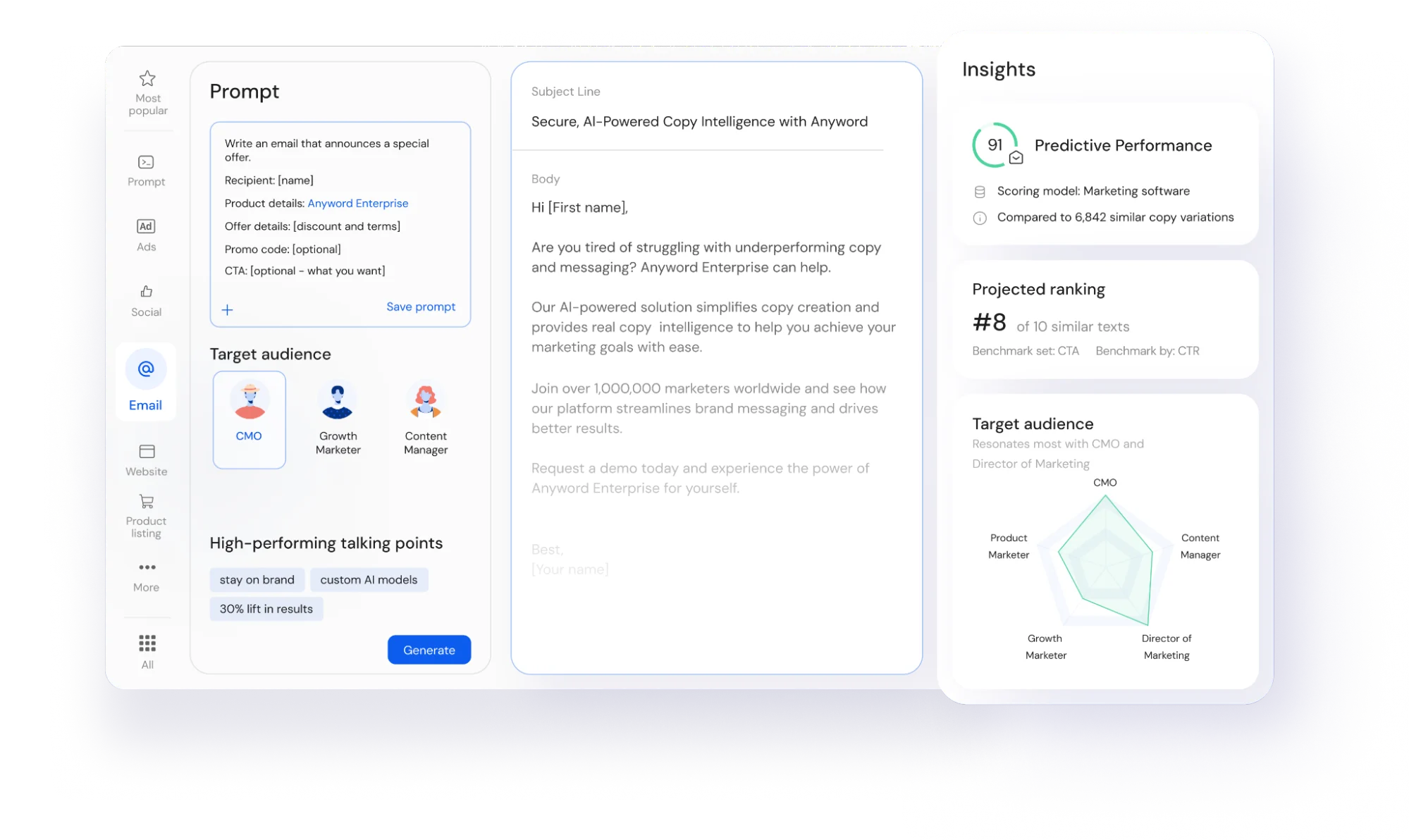
Anyword optimizes content with predictive performance for high conversion
Rytr, on the other hand, is a versatilist running on advanced AI models (likely from OpenAI). Its quality is in its diversity… While the underlying models are powerful, we found Rytr’s output is clearly optimized for speed, resulting in “thinner” first drafts. It creates a very fast starting point, but we (as writers) had to spend more time expanding the content with data and depth.
Winner: Depends on Goal
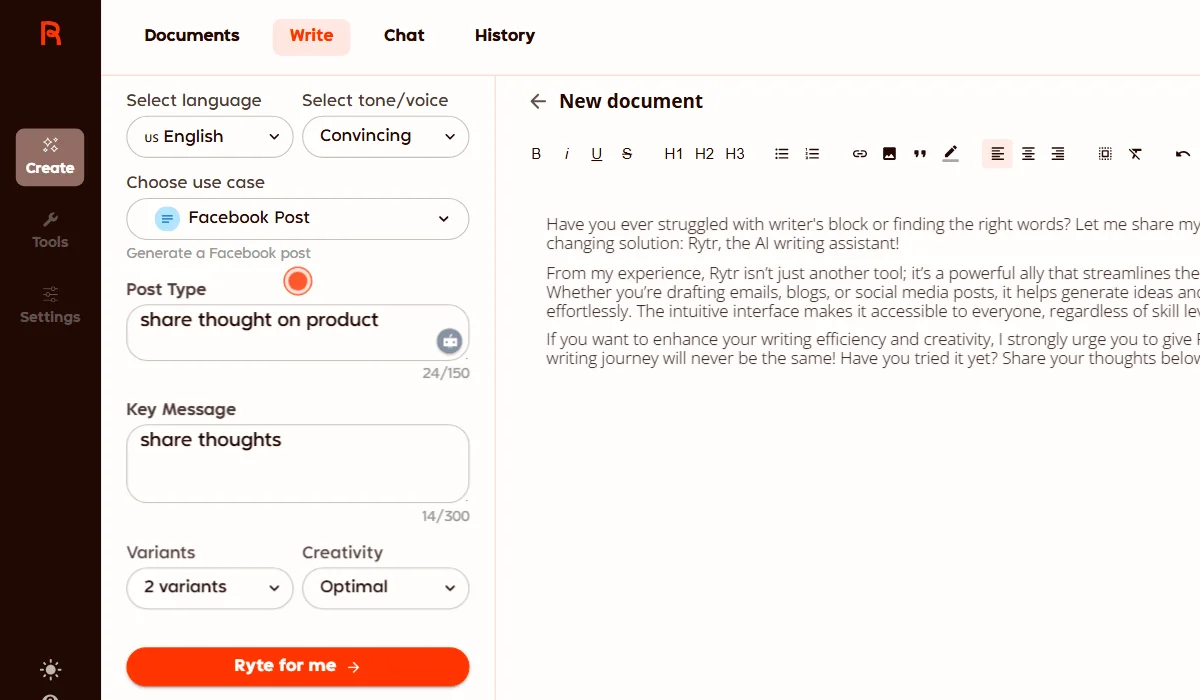
Rytr’s fast content generation with diverse but less detailed drafts
Let’s chat about SEO! For our team, this category wasn’t even a fair fight.
Anyword is really designed with SEO in mind right from the start. When we tried out the “Blog Wizard,” we were impressed. We simply provided a target keyword, and it quickly offered a whole framework with relevant keywords and talking points. Then it seamlessly drafted the meta title, description, and body content—all in one highly structured process. It truly feels like an “all-in-one” solution, though we did find this structure to be rigid, forcing users to follow its specific steps without many changes
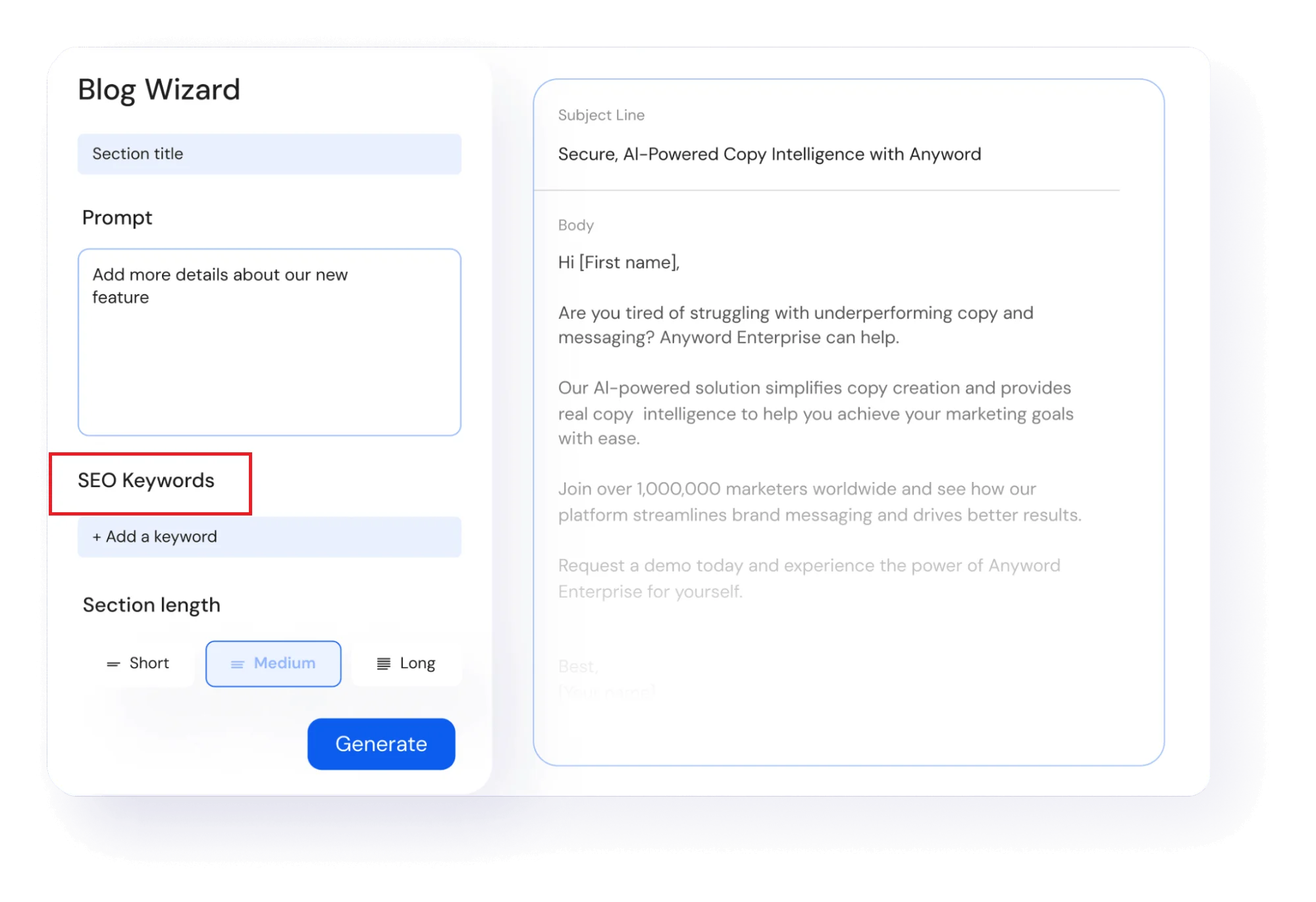
Anyword’s all-in-one SEO solution with structured blog content generation
On the other hand, Rytr seemed a bit disconnected for us. While it has some great tools, they didn’t quite work together as well as we’d hoped. The workflow felt a little difficult to use because we had to:
It felt like there was a lot of manual effort involved, which is something we’d prefer to avoid. Plus, without a solid built-in keyword research tool, we had to rely on an external Semrush integration, which added another layer of complexity.
It wasn’t a tough decision. Anyword gives a complete, integrated experience, while Rytr feels like a collection of separate parts that need extra help to work smoothly.
Winner: Anyword
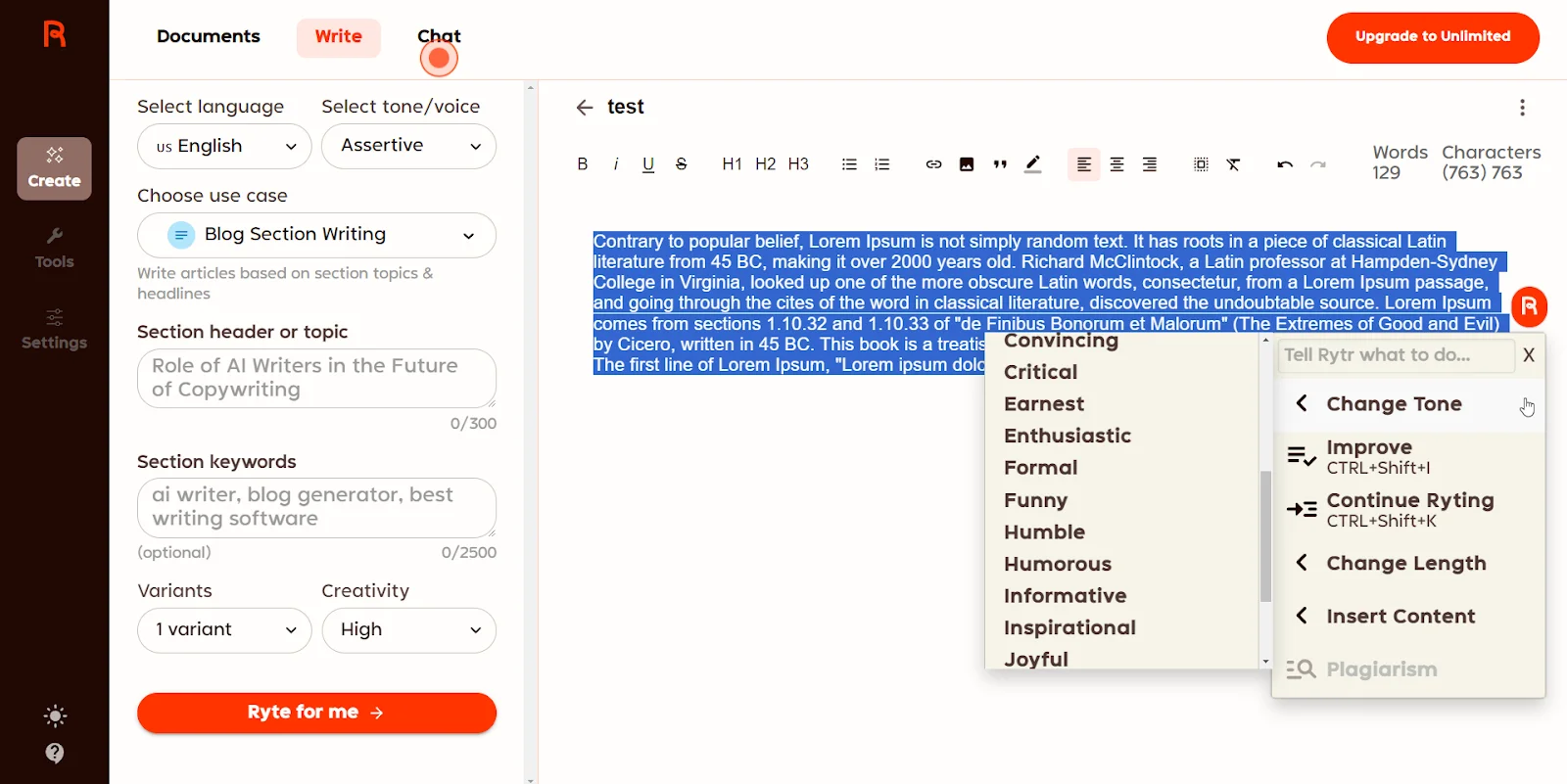
Rytr’s fragmented workflow and lack of integrated SEO tools
Anyword’s approach to Brand Voice is clearly built for enterprise teams. It’s a “top-down” system. Our team found we could create profiles by uploading style guides, defining audience personas, and even setting “Custom Rules” (e.g., “Must not use this word”). This is a tool for a Brand Manager to enforce compliance across a large organization.
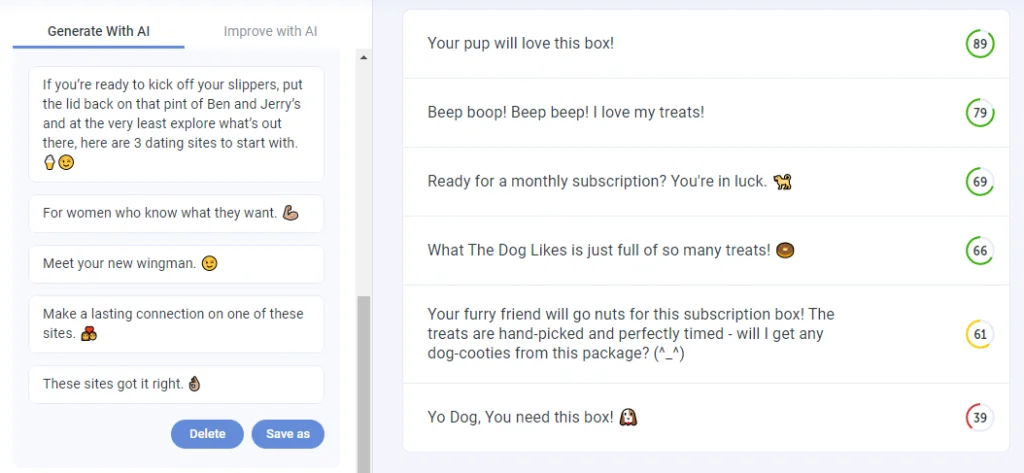
Anyword’s enterprise-level Brand Voice management with custom rules
Our experience with Rytr’s “My Voice” feature was the exact opposite. It’s a fast, simple tool built for the individual writer. We tested it: we pasted ~100 words of our own writing, the AI analyzed it, and in seconds, a new “custom tone” was added to our dropdown.
This isn’t for “compliance”; it’s for “personal copying,” allowing a freelancer to quickly switch between their own voice and the voices of 5 different clients. (It’s a critical distinction, however: our team confirmed this multi-voice capability is only on the $29 Premium plan. The entry-level $9 plan limits you to a single custom tone.)
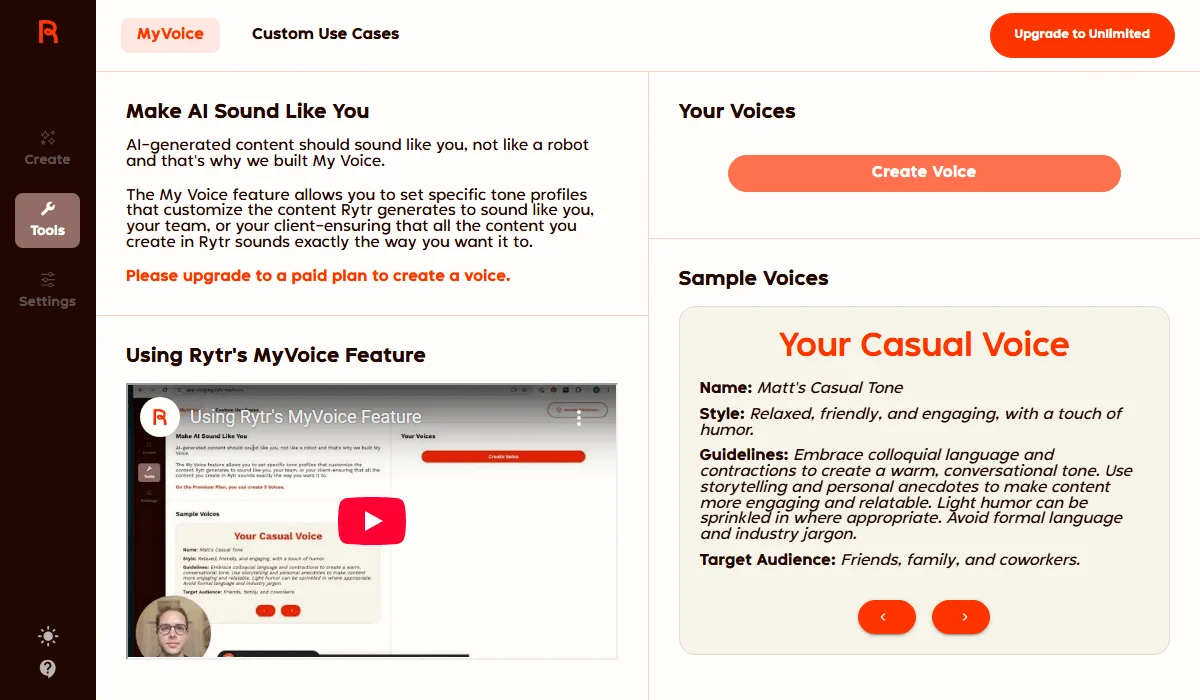
Rytr’s “My Voice” for individual writers with customizable tones
Both tools are excellent, but they solve opposite problems. Anyword is built to control a brand’s voice for a team. Rytr is built to replicate many voices for an individual. Neither is “better”; they are just built for different (and equally important) jobs.
Winner: Depends on Goal
Anyword’s integration list is built for the enterprise “data stack.” Our analysis of their integration page shows a focus on deep, “backend” connections: HubSpot, Google Ads, Meta Ads, and LinkedIn Ads. It also features an API. These integrations are designed to plug the tool into a company’s marketing data flow.
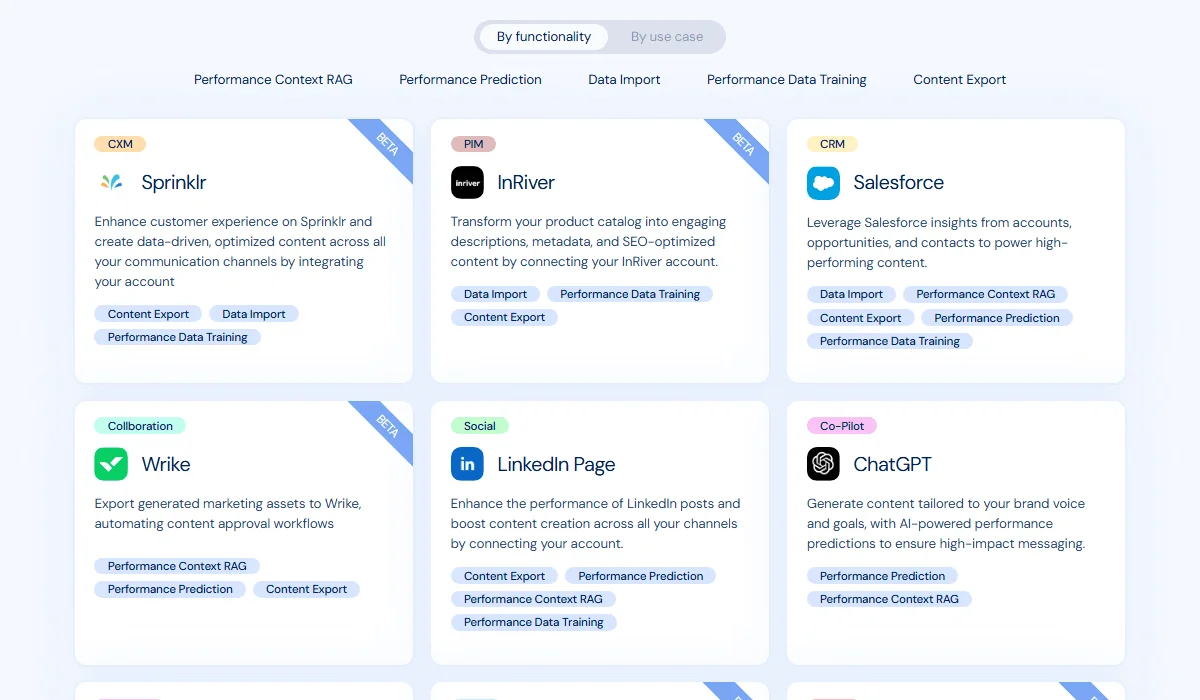
Anyword’s enterprise integrations with HubSpot, Ads, and API support
Rytr’s approach is the exact opposite. Its “killer” feature is the Chrome Extension, a “frontend” tool. Our team confirmed this lets you work directly inside Gmail, LinkedIn, or your CMS. This is a “writer-stack” integration. Critically, our research (and the link you provided) confirms that Rytr also offers a full API, making it far more powerful than often reported.

Rytr’s “writer-stack” integration with Chrome Extension
Both tools, therefore, offer an API. But their priorities are reversed. Anyword connects to the company’s ad platforms. Rytr connects to the writer’s active workflow. One isn’t “better”; they are just built for different jobs.
Winner: Depends on Goal
You may be interested in:
WriteSonic vs Rytr (2025): Which is the best AI Writer?
Jasper AI vs. Rytr (2025): Which is the Best AI Writing Assistant?
After all our testing, here’s our honest breakdown of the good and the bad.
| Anyword | Rytr | |
|---|---|---|
| Pros | ✅ Predictive Analytics (82% accuracy) | ✅ Permanent Free Plan (10k chars/month) |
| ✅ Integrated SEO-Writing System | ✅ Extremely Easy to Use (zero learning curve) | |
| ✅ Enterprise-Level Brand Voice Mgt. | ✅ Excellent “Writer-Stack” Integration (Chrome Extension) | |
| ✅ High-Level Security (SOC 2, ISO, HIPAA) | ✅ Highly Versatile (40+ use cases, creative & marketing) | |
| ✅ Deep “Data-Stack” Integrations (HubSpot, API) | ✅ Supports 30+ Languages (industry-leading) | |
| Cons | ❌ “Overkill” for individuals/freelancers | ❌ No Performance Prediction |
| ❌ Rigid Blog Wizard (Structured process, but lacks creative flexibility) | ❌ Fragmented SEO Tools (must “manually assemble”) | |
| ❌ Credit Card Required for trial | ❌ “Thinner” Blog Quality (needs heavy writer input) | |
| ❌ Less Creative Versatility (100% marketing-focused) | ❌ Basic Brand Voice (for individuals only) | |
| ❌ Weaker “Writer-Stack” Integration (No Chrome Extension) |
The pricing tells the whole story. We checked both sites, and here’s the real deal.
|
Anyword |
Rytr |
|
| Free Option | 7-day trial | Free forever (10k characters/month) |
| Credit Card Required | Yes (for trial) | No (for free plan) |
| Entry Price | $49/month (Starter Plan) | $9/month (Unlimited Plan) |
| Mid-Tier | $99/month (Data-Driven Plan) | N/A |
| Premium | Custom Pricing (Business Plan) | $29/month (Premium Plan) |
| Enterprise | Custom Pricing (Enterprise Plan) | Not available |
| Refund Policy | No refunds | No refunds |
| Annual Discount | Yes (e.g., $49/mo becomes $39/mo) | Yes (2 months free) |
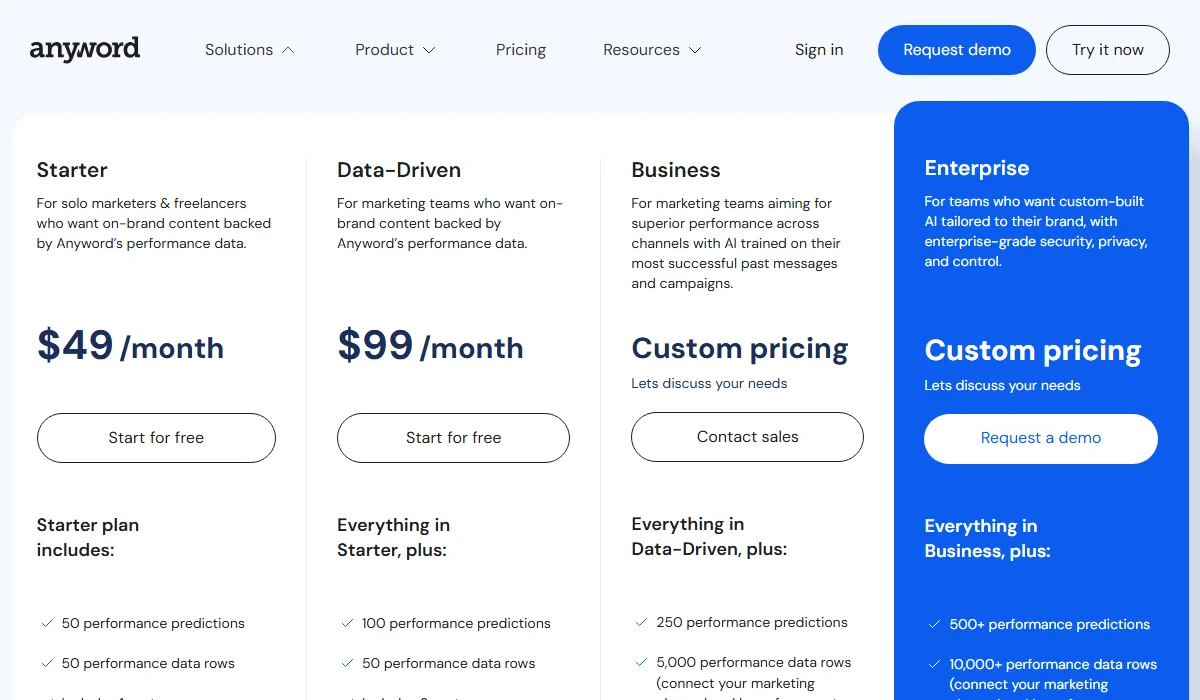
Anyword Pricing Plan

Rytr Pricing Plan
Our Critical Insight:
Before you pull out your wallet, our team suggests you ask these questions:
You may be interested in:
Copy AI vs Rytr (2025): Which Is Better for an AI Writing Assistant?
Anyword vs ChatGPT: Which is the best for Writers in 2025?
The truth is, these tools aren’t really competitors. They serve completely different users. Anyword is the enterprise solution for teams. Rytr is a tool made simple for everyone else
Choose Anyword if you’re:
Choose Rytr if you’re:
We recommend you start with Rytr’s free plan to see if it meets your daily needs. If you find yourself leading a team or managing big ad budgets, it’s time to graduate to Anyword.
You may be interested in:
Anyword vs Copy.ai: Which is the best for Writers in 2025?
Anyword vs Jasper: Which is the best for Writers in 2025?
Anyword vs Outranking: Which is the best for Writers in 2025?

